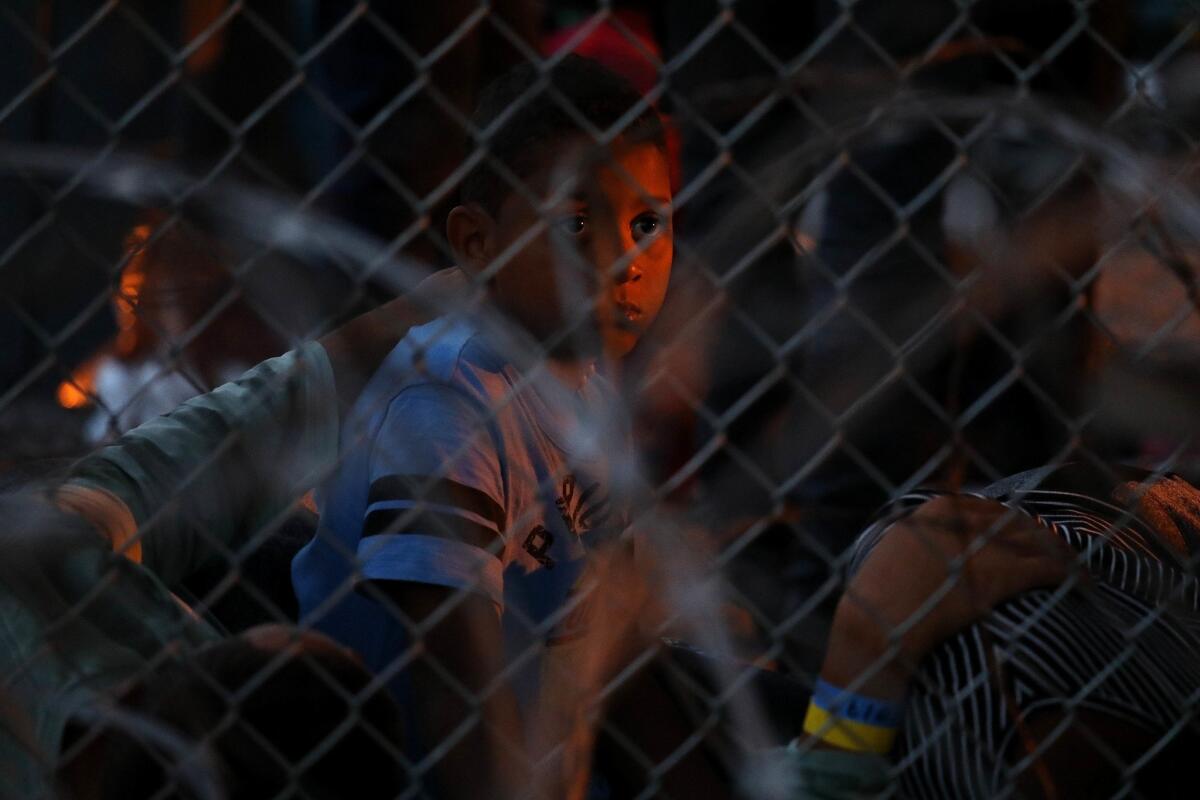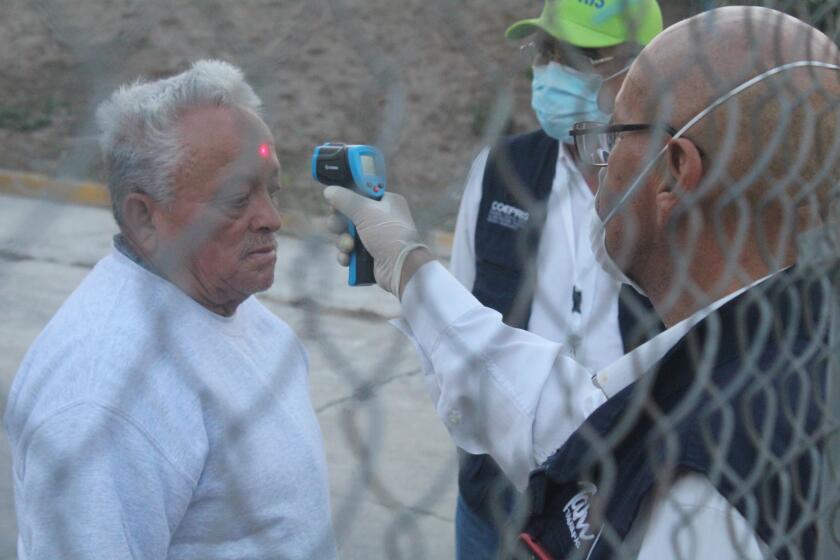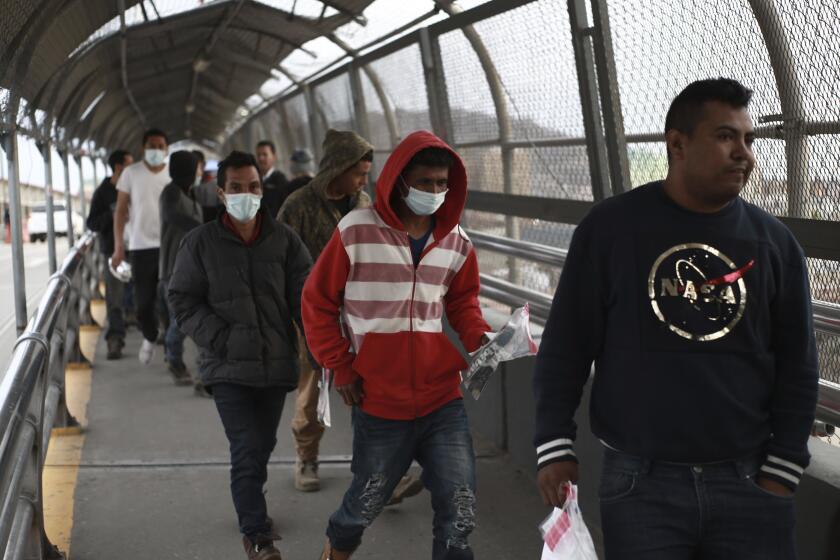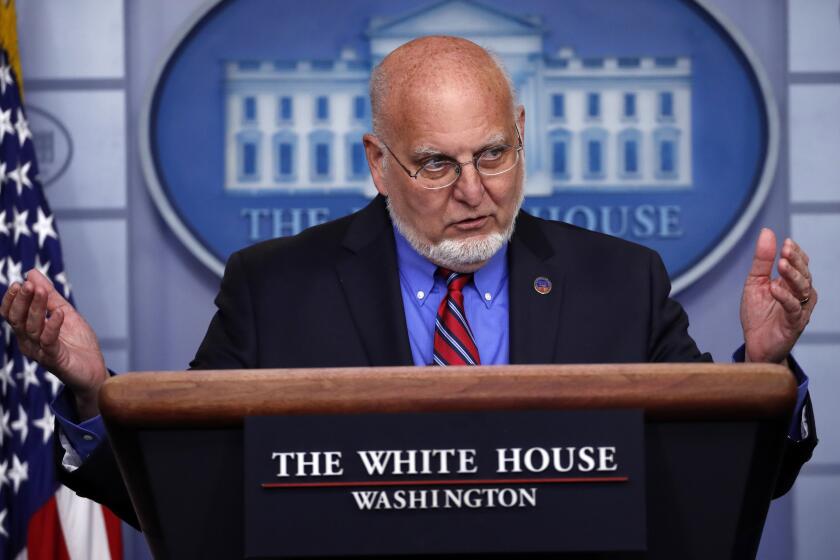Citing coronavirus, Trump officials refuse to release migrant kids to sponsors — and deport them instead

- Share via
WASHINGTON — The 17-year-old Guatemalan boy in a California detention center for migrant children has been held for more than 400 days.
He’s one of the longest-held of the roughly 1,800 minors in the U.S. immigration detention system — the largest in the world, and one now riddled with the novel coronavirus.
For the record:
3:59 a.m. May 15, 2020An earlier version of this article said a 17-year-old boy had been held for more than 400 days in a federal migrant detention center in California. Some of his 400 days in custody have been at detention centers in other states.
Under a decades-old legal settlement, the government is required to hold migrant children in “safe and sanitary” conditions and make “prompt and continuous” efforts to release them and reunify families. Two federal judges in recent weeks have ruled that the administration has violated the terms of that agreement in its handling of migrant children.
The Guatemalan teen — detained at the center in Fairfield, in Solano County — has been held by the Trump administration far longer than contemplated under the settlement.
It’s not for lack of someone wanting to take him. When Bryce Tache and James Donaldson read on social media about the teenager, whom they call Mariano to protect his identity, the Minneapolis couple quickly applied to sponsor him, which would allow him to be released.
That was six months ago.
Now they fear the administration is using the pandemic to try to keep the boy until he turns 18, when officials can more easily deport him.
Officials at the Department of Health and Human Services, which oversees the detention of unaccompanied minors, denied making any policy changes amid the pandemic to prioritize enforcement actions against migrant children and parents.
“HHS is a child welfare agency, not a law enforcement agency,” spokesman Mark Weber said Friday. “If there is a delay in unification, it is for public health reasons.”
Across the country, however, lawyers who represent migrant kids say the administration is refusing to release children to ready sponsors. Court documents and lawmakers back them up.
Trump administration attorneys have argued in court that children are safer from COVID-19 in custody — even as the government quietly ramps up efforts to deport them. In recent weeks, officials have pulled scores of children and parents from detention in secretive operations to remove them from the U.S., according to lawyers, migrants’ affidavits and the receiving countries. Some were sick. A number were challenging administration policies in court.
Since March, when Trump declared a national emergency over the coronavirus, the administration has cut the population of detained kids and families by about 2,400, according to data from the Office of Refugee Resettlement, or ORR, the agency in the HHS department that Congress charged with the care and placement of unaccompanied migrant minors, and Immigration and Customs Enforcement, which detains migrant kids with their parents.
But releases of kids to sponsors, already slowed under Trump, have nearly stalled during the same time period, recent litigation shows.
After the administration essentially sealed the U.S. border in March as part of its coronavirus response, few new children and families have entered the system: The number of unaccompanied migrant children turned over to the refugee resettlement office has dropped roughly 97%.
At the same time, ORR has released far fewer kids to sponsors than in previous months, and those left behind are being held longer.
Since March, the agency lists about 50 children as having been removed from the U.S. and roughly 180 more as having been transferred to ICE custody. ICE wouldn’t say how many minors it had deported.
The U.S. data appear to conflict with numbers from the countries receiving U.S. deportees. From March through May, Guatemala’s immigration officials, for example, report that the U.S. has deported 417 minors to that country alone.
“We don’t get notice from the government when families get dragged from their rooms in the middle of the night,” said Shay Fluharty, director of the Dilley Pro Bono Project, a legal clinic at an ICE detention center in Dilley, Texas, that holds kids with their parents.
Laura Peña, a former ICE attorney, now works as pro-bono counsel with the American Bar Assn.’s Pro Bono Asylum Representation Project, which helped represent an unaccompanied 16-year-old recently deported to Honduras.
“It’s outrageous, trying to deport this child and deny them rights during a pandemic,” Peña said, a few hours before the girl was removed from the U.S. “Why?”
At least 14 other migrants at the shelter were infected in a scenario long feared by Mexican health authorities.
The Times reviewed extensive court records and spoke with more than 20 officials, lawyers, potential sponsors and immigrants for this story. Many spoke on condition of anonymity for fear the administration would retaliate against children and families in custody.
In one case, officials in the ORR blocked a detained teen from speaking to a reporter, despite the permission of the teen, her parent and her legal representatives. The “individual risk posed to the minor seems to far outweigh the benefit” of an interview, the agency said.
ICE provided data on families and COVID-19 cases in custody but did not respond to questions about its policies.
Lawyers across the country said that under the cover of the coronavirus, the ORR is coordinating with ICE to target kids in custody for removal.
“Just as all of this craziness happened with the coronavirus,” said A’Kiesha Soliman, a lawyer with the unaccompanied minors program at Diocesan Migrant and Refugee Services in El Paso, Texas, “it seems like they’re ramping up deportations of children who we’d normally have more time to find relief for.”
Soliman warns young clients that despite legal rules designed to protect them, “they can be removed at any time.”
In Mariano’s case, the ORR has refused to consider the Minneapolis couple’s application because they aren’t legal guardians or immediate relatives and didn’t have a prior relationship with the teenager, according to Ricardo de Anda, the boy’s attorney.
Mariano’s parents gave permission in an affidavit for him to be released to the Minnesota family. Grinding poverty in the Guatemalan highlands led them to abandon Mariano when he was a boy, de Anda said. They gave him to another man who tried to pass him off as his biological child while entering the United States last spring, court documents say.
Federal rules require additional checks for victims of trafficking as well as for potential sponsors who didn’t know a minor before he or she arrived in the U.S. — but neither disqualifies a child from being placed with a family.
De Anda helped Mariano sue, arguing that the government was violating his rights by denying him sponsorship and protections.
“You have good-hearted Americans who take this child under their wings,” de Anda said. “But it’s like pulling teeth.”
Tache and Donaldson and their two teenage sons have moved into a larger home so that Mariano would have his own room. The couple hopes to win guardianship of Mariano by attesting that as a trafficking victim, he is eligible for a Special Immigrant Juvenile visa.
With the government restricting transportation of migrant children amid the crisis, they said they are prepared to drop everything and drive to California to pick Mariano up.
For now, they talk with him at least once a week by phone. The teen describes some detention staff as wearing masks but not practicing social distancing. He’s increasingly depressed.
“What if he gets sick tomorrow or the next day?” Tache said.
“I personally believe the government’s end goal is to send everyone back to their country of origin,” he said. “The right thing and safe thing for him right now is to be with a family who can help him.”
* * * * *
Late last month, two federal judges — including District Judge Dolly Gee in Los Angeles, who oversees the Flores agreement, the legal settlement that sets standards for civil detention of migrant children — ruled that the administration’s actions toward migrant kids and parents amid the pandemic violate the agreement and federal law.
That same week, a third federal judge threw out a suit to force nationwide releases from detention facilities that health experts and judges have called “tinderboxes” for the virus.
Almost all the kids are being held significantly longer than the Flores settlement allows, according to the recent litigation. The vast majority, as well as the parents detained with them, are asylum seekers, and many have legal orders in place known as stays of removal, intended to protect them from deportation. Most have relatives in the U.S. ready to sponsor them. The government has not provided evidence that they are flight risks or a danger, Gee noted in her ruling.
Administration officials say they are following guidelines from the Centers for Disease Control and Prevention. Migrants, their advocates, health experts and lawmakers, however, have documented a lack of sanitation, personal protective equipment and medical attention.
Government attorneys argue that the minors are safer detained.
Dr. Amanda Cohn, a CDC official, submitted a written declaration in the case before Gee that releasing unaccompanied children, “likely increases risk of exposing [them] to COVID-19 relative to remaining in custody.”
As of Wednesday, ICE had reported 943 coronavirus cases among migrants in custody, with more than 50% of those tested coming up positive. About 6% overall have gotten a test.
April Grant, an ICE spokeswoman, said Friday there were no cases of the virus in its three family detention centers but declined to say how many kids and parents had been tested. Families at the sites have undergone tests and are currently quarantined, lawyers told The Times.
About 1,500 unaccompanied migrant kids are held at nearly 200 federally contracted facilities across the U.S. supervised by the ORR. From late March to May, confirmed cases of COVID-19 among those minors increased from four to 68, according to agency data. About one in three children tested were infected, but the government has tested only 12% of those in the agency’s custody.
* * * * *
Every time Esvin talks with his 4-year-old daughter, she cries.
It’s been nearly six months since officials separated them at an immigration detention facility in Raymondville, Texas, he recounted.
“Why did you leave me here?” she asks him over the phone.
“I didn’t leave you,” he explains. “They took you away from me.”
Esvin, who asked that his full name and the identity of his child not be published for fear of reprisals, left Guatemala in November because of violence, he said. After a week of detention in Texas, officials told him they were taking away his child, citing a roughly decade-old charge in Guatemala for which he was never convicted.
Coronavirus border closures and cascading crackdowns have left thousands of desperate migrants trapped in limbo in harsh conditions.
Esvin spent months at three immigration detention centers in two states before he was released on bond in early March from a Mississippi facility that now has 15 confirmed coronavirus cases. He currently lives with his aunt, uncle and their two children at their home in New Jersey.
He has tried to reclaim his daughter but has been met with repeated roadblocks.
First, his application was delayed for a month because officials said they were not conducting home visits during the pandemic. Then a social worker told him the agency had forgotten to take the fingerprints of everyone in the New Jersey home.
“The government just keeps giving me excuses,” Esvin said in Spanish. “They want this document. I give it to them. Then they ask for something else.”
Since March, the ORR has issued orders to stop placements in California, Washington state and New York and more recently has limited out-of-state releases or transfers.
The agency also added requirements for fingerprinting most potential sponsors and shared information with the Homeland Security Department — a practice Judge Gee noted wasn’t required and that other officials warn discourages families from coming forward. The agency also demanded home studies, then discontinued doing them, despite the possibility of virtual visits.
Officials also delayed the release of minors from detention facilities that have cases of COVID-19, which a medical expert testifying for migrants suing the government likened to “leaving them in a burning house rather than going in to rescue them.”
Gee agreed the government shouldn’t rush to release migrant kids “en masse” or stop vetting potential sponsors amid coronavirus. But the government’s policies have unnecessarily delayed kids’ release, she ruled.
“Under the current extraordinary circumstances in the midst of a pandemic, ORR’s obligation to release minors without unnecessary delay requires moving with greater speed ... where a suitable custodian exists,” Gee wrote.
Lawyers say the government is neglecting the specific needs of detained children.
In some cases, babies and toddlers have been provided adult-sized masks, if any. In others, according to court filings, outbreaks have led officials to stop classes or activities for young children or impose isolation, which medical experts and judges assess as traumatic.
“Just put yourself in my shoes,” said Esvin. “She is my daughter. She’s not an object to be played with. She is a human being.”
At the ICE facility in Dilley — the largest detention center in the United States — one Honduran mother had been vomiting and coughing for weeks before she lost consciousness in front of her 4-year-old son.
The woman fled Honduras with her son to seek asylum in the United States. Immigration officials initially detained them in Arizona, where she first started showing symptoms. In the early hours of April 17, guards sent the sick woman and her toddler straight from Dilley’s small medical clinic to a deportation flight.
“Señora, get up, time to leave,” one guard said, grabbing her roughly by the arm, according to the woman’s legal declaration.
Ultimately, the Honduran woman was so ill that ICE officers pulled her and her son off the flight. An ambulance brought them and another sick family to a tent clinic, where the woman was tested for the coronavirus. Then they were driven back to Dilley and put into quarantine with other families who lawyers say are being held incommunicado.
In recent weeks, ICE has moved to deport dozens of these kids and parents, despite many being plaintiffs in existing lawsuits, according to the lawyers.
No one has told the woman her coronavirus test results; they didn’t test her son. After spending almost 24 hours a day in isolation, he has started kicking the walls, becoming “inconsolable and aggressive,” she testified. “My son is losing his mind.”
Said Fluharty, director of the Dilley legal clinic: “It really is a prison for these kids, and still they’re not safe.”
O’Toole reported from Washington and Carcamo from Los Angeles.
The CDC report was stricter about how to reopen businesses and institutions, and what to do in case of a coronavirus resurgence as states reopen.
More to Read
Get the L.A. Times Politics newsletter
Deeply reported insights into legislation, politics and policy from Sacramento, Washington and beyond. In your inbox twice per week.
You may occasionally receive promotional content from the Los Angeles Times.















